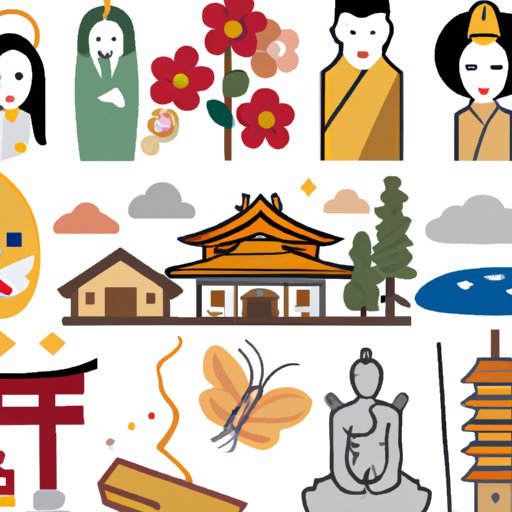Introduction
Japan is home to a unique and complex culture that has been evolving for centuries. From ancient spiritual practices to modern technologies, Japanese culture has developed in many interesting ways. This article provides an overview of the various aspects of Japanese culture, including its traditions, beliefs, and influences. It also examines how religion, geography, technology, and gender roles have shaped the culture of Japan.
Exploring the Traditions, Practices and Beliefs of Japanese Culture
The culture of Japan is deeply rooted in its traditional beliefs and practices. Shintoism and Buddhism are two of the most influential belief systems in Japanese culture. These religions have shaped many aspects of life in Japan, from religious ceremonies and festivals to values and moral codes.
Festivals and celebrations are an important part of Japanese culture. Many of these events are based on Shinto or Buddhist beliefs and traditions. For example, Obon is a Buddhist festival that celebrates the spirits of ancestors, while Setsubun is a Shinto event that marks the start of spring. Other important festivals include Tanabata, which celebrates star-crossed lovers, and Hina Matsuri, which celebrates girls’ health and happiness.
Family values are an integral part of Japanese culture. Respect for elders is highly valued, and families often live together in close-knit communities. Education is also highly valued, and students are expected to work hard and strive for excellence. Social etiquette is also important, and individuals are expected to show respect and consideration to others.

Examining the Influences of Religion on Japanese Culture
Shintoism and Buddhism are two of the most influential religions in Japan. Both religions have had a significant impact on Japanese culture and values. Shintoism is an ancient religion that focuses on the worship of Kami, or gods, and emphasizes the importance of nature and harmony. Buddhism was introduced to Japan in the 6th century and is centered around the teachings of the Buddha. It emphasizes compassion, wisdom, and self-discipline.
Confucianism has also played an important role in Japanese culture. This philosophy, which originated in China, emphasizes the importance of social order and respect for authority. It has shaped many aspects of Japanese society, such as education, family structure, and social etiquette.
Christianity has had a relatively small but significant impact on Japanese culture. The religion was first introduced to Japan in the 16th century by Jesuit missionaries. Today, there are approximately 1 million Christians in Japan, and the religion has influenced some aspects of Japanese culture, such as art and literature.
Analyzing the Impact of Geography on Japanese Culture
Japan’s geography has had a major influence on its culture. Most of the country is made up of coastal plains, with mountains occupying the center. This mountainous environment has resulted in isolated communities and unique regional cultures. The climate is mild, with four distinct seasons, and the vegetation is lush and varied.
The coastal areas of Japan have been heavily influenced by trade and contact with other countries. This has resulted in a mix of cultural influences from East Asia, Europe, and the Americas. The coastal regions are also home to many of Japan’s major cities, such as Tokyo, Osaka, and Kyoto.

Investigating the Impact of Technology on Japanese Culture
Technology has had a major impact on Japanese culture. The emergence of modern technology in the 19th century led to the rapid modernization of the country. This included advances in manufacturing, transportation, communication, and entertainment. Today, Japan is one of the most technologically advanced countries in the world.
Technology has had a major impact on business and manufacturing in Japan. Automation and robotics have drastically changed the way products are manufactured and distributed. Technology has also revolutionized communications, with the rise of email, video conferencing, and social media.
Technology has also had an impact on social media and communication. Social networks such as Twitter and Instagram have become popular in Japan, allowing people to stay connected with friends and family. Smartphones and tablets have also enabled people to access the internet and communicate with others more easily.

Exploring the Role of Gender in Japanese Culture
Gender roles have played an important role in Japanese culture. Historically, men were expected to take care of the family and earn money, while women were expected to be responsible for housework and child-rearing. This traditional view of gender roles has been slowly changing in recent years.
Today, women are increasingly taking on roles outside of the home. More women are entering the workforce and pursuing higher education. In addition, the government has implemented policies to promote gender equality, such as equal pay for equal work.
Gender roles still play an important role in Japanese society. Men are still expected to be breadwinners, while women are expected to take care of the home and children. This has resulted in unequal opportunities for women in the workplace and has contributed to the gender wage gap.
Conclusion
Japanese culture is complex and fascinating. It is shaped by a variety of factors, including religion, geography, technology, and gender roles. Shintoism and Buddhism are two of the most influential religions in Japan, while coastal areas have been heavily influenced by trade and contact with other countries. Technology has revolutionized business and manufacturing, while gender roles still play an important role in society. This article has provided an overview of the various aspects of Japanese culture and examined how they have shaped the culture of Japan.
(Note: Is this article not meeting your expectations? Do you have knowledge or insights to share? Unlock new opportunities and expand your reach by joining our authors team. Click Registration to join us and share your expertise with our readers.)
